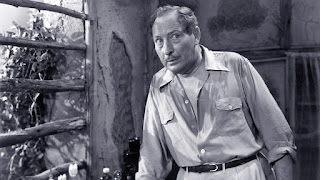THE MAD DOCTOR OF MARKET STREET
(1942)
Dir - Joseph H. Lewis
Overall: MEH
Director Joseph H. Lewis and screenwriter Al Martin collaborate on another B-unit horror film, this time under the prestigious Universal banner with everyone's favorite mad scientist Lionel Atwill stepping outside of his comfort zone by playing...a mad scientist. Released as a second feature along with The Wolf Man, the apply titled The Mad Doctor of Market Street struggles with misplaced comic relief and a preposterous plot where your typical megalomaniacal scientist is conducting rejuvenating experiments on unwilling subjects before he is able to briefly dupe some primitive natives into thinking that he is a life-giving god when he and some others are shipwrecked on an island. Dopey and melodramatic in equal measures, Atwill cranks up the scenery chewing more than usual and meets a grisly, fitting end, but everyone else on screen are either broken English-speaking white people in brown face or cheery white people who do not seem to be taking their predicament seriously. Neither should the viewer for that matter.
(1942)
Dir - Joseph H. Lewis
Overall: MEH
Director Joseph H. Lewis and screenwriter Al Martin collaborate on another B-unit horror film, this time under the prestigious Universal banner with everyone's favorite mad scientist Lionel Atwill stepping outside of his comfort zone by playing...a mad scientist. Released as a second feature along with The Wolf Man, the apply titled The Mad Doctor of Market Street struggles with misplaced comic relief and a preposterous plot where your typical megalomaniacal scientist is conducting rejuvenating experiments on unwilling subjects before he is able to briefly dupe some primitive natives into thinking that he is a life-giving god when he and some others are shipwrecked on an island. Dopey and melodramatic in equal measures, Atwill cranks up the scenery chewing more than usual and meets a grisly, fitting end, but everyone else on screen are either broken English-speaking white people in brown face or cheery white people who do not seem to be taking their predicament seriously. Neither should the viewer for that matter.
(1944)
Dir - William Beaudine
Overall: MEH
The second pairing of Shemp Howard and Billy Gilbert, Crazy Knights, (Ghost Crazy), is a barely watchable Abbott and Costello knock-off from the ever-busy Poverty Row studio Monogram Pictures. As a pair of shifty carnies, (Shemp is the one in the gorilla suit because you gotta have one of those), they decide to take a vacation and in-turn pick up some hitchhikers who lead them to a haunted house that is of course not really haunted. While Howard was delightful and more famous for his tenure in The Three Stooges, he basically does the same shtick here except with a comparatively higher IQ at his disposal. Unfortunately and unlike other comedy duos or tropes, he and his side-kick Gilbert have indistinguishable personalities, both stuttering, stammering, and falling down at the slightest thing that is meant to spook them. The gags almost exclusively revolve around one of them being slow on the draw as to something unusual happening, cue leaping in the air, widening their eyes, and squealing like children. This would be fine if any of the gags were funny and/or not so derivative of better comedic players who behave the same way, namely Lou Costello whose mannerisms these guys are clearly channeling. With such a dopey script to work with, forgettable supporting players, and flat direction from William Beaudine, it just becomes a sixty-three minute waste of potential giggles.
(1947)
Dir - Joseph L. Mankiewicz
Overall: GOOD
A renowned supernatural romance from the also renowned filmmaker Joseph L. Mankiewicz, The Ghost and Mrs. Muir expertly morphs from a lighthearted comedy into a poignant melodrama about the allure of companionship amongst those who passively accept an existence of solitude. Screenwriter Philip Dunne adapts R.A. Dick's 1945 novel of the same name, (which would later be turned into a sitcom at the turn of the 1970s), but the source material's first cinematic interpretation here tiptoes around the inherent love story as much as it does its melancholy. Gene Tierney's protagonist is open to fall in love from the onset, at first being uncontrollably drawn to a dead sea captain's house just as she is to the sea captain himself, who miraculously appears to her as a bitter curmudgeon yet is quickly won over by Tierney's relentless charm. Rex Harrison's gruff demeanor works against Tierney's graceful innocence, until a more tangible love interest dashes her hopes yet leaves her spirit intact for the eventual afterlife. Mankiewicz spends little time on spooky set pieces and instead lets the story's sensitive themes play out gradually, with Bernard Hermann's perpetual score smoothing things over even further.



No comments:
Post a Comment